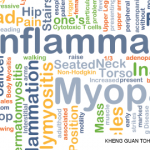Significant data suggest that scleroderma is paraneoplastic in some patients, she said. Scleroderma patients with anti-RNA polymerase III antibodies have a greater-than-fourfold increased risk of cancer within a few years of scleroderma onset, and biological studies have demonstrated that anti-RNA polymerase III antibodies may be the manifestation of an immune response to tumor antigens, she said. Testing for this antibody may help rheumatologists identify scleroderma patients who should undergo more extensive cancer screening at disease onset.
Rheumatologists should perform a comprehensive physical examination on all new systemic sclerosis patients, and colonoscopy should be considered for patients who are 50 years of age or older. Female patients should have mammography at diagnosis and annually at 40 or older, pap smear every three years at 21 to 65, updated pelvic and gynecological examinations and, in some patients, transvaginal ultrasound or CA-125 testing, Dr. Shah said. Male patients should have an updated digital rectal exam and PSA test, and testicular examination should be performed in men under 40. All systemic sclerosis patients should be advised about the importance of smoking cessation and the use sunscreen to protect against cancer, she said.
As in myositis, effective cancer therapy may also be effective scleroderma therapy. Therefore, early identification and treatment of an underlying malignancy should be an important priority in patients with new-onset scleroderma.
Complex Associations
Why are autoimmunity and malignancy potentially linked? The clinical associations may be incredibly complex, said Antony Rosen, MD, director of rheumatology at Johns Hopkins Arthritis Center in Baltimore. “Even though we see cancer and autoimmunity largely as separate issues, sometimes, in rheumatic disease patients, they come together in time,” he said.
Dr. Rosen used the analogy of similar animals or land formations on distant continents that were once joined as part of the primordial land mass. Similarly, cancer and autoimmunity may cocluster, and immunoediting may help us understand why, he said.
Some autoantibodies may be an immunologic response to cancer in these patients. In one study of 16 scleroderma patients who also had cancer, eight had autoantibodies to (RNA polymerase III) RPC1 and had a very short duration to onset of cancer, he said. Of these eight, three also showed the very rare POLR3A mutation. When examining test results, look for a loss of heterozygosity, he said. “There was a striking loss of heterozygosity at the POLR3A locus exclusively in patients who had antibodies against RPC1,” something not seen in patients with other antibody specificities, he said. Patients may specifically respond to mutated antigens, responding by producing distinct sets of T cells. “Likely, the mutant form turns the immune response on; the antibodies are turned on, and this enables the patient to capture that antigen and make T cells to respond” to the tumor’s threat.



